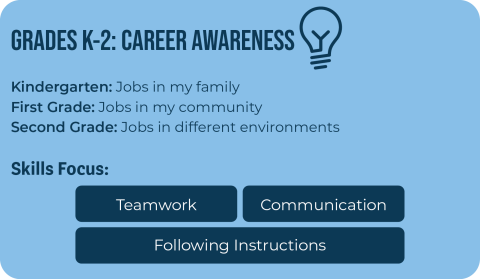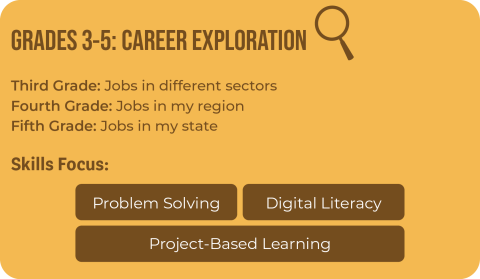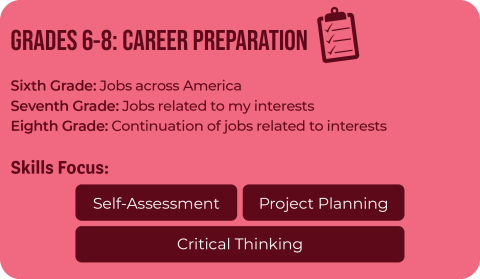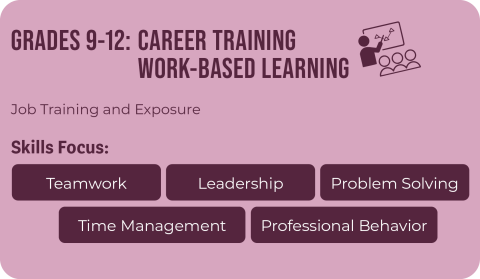K-12 Workforce Development
K-12 Workforce Development
K-12 Workforce Development Model

The MDE Office of Career and Technical Education and Workforce Development is guiding and supporting district personnel across Mississippi in developing and strengthening partnerships among businesses, educational systems, economic development organizations, and workforce agencies to ensure alignment with statewide workforce development goals. In collaboration with other workforce development state agencies, MDE is identifying critical workforce needs while tracking and analyzing workforce data to ensure alignment between educational outcomes and labor market demands, as well as assessing and incorporating best practices from national workforce development models to enhance outcomes and promote awareness of workforce development initiatives.
MDE created a statewide taskforce to drive the conversation around what the MS K12 Workforce Development Model should include. Representatives from across MS participated and included Elementary Principals and Teachers, Middle School Principals and Teachers, High School Principals and Teachers, CTE and Workforce Directors, Superintendents, Business and Industry, and Accelerate MS. The taskforce developed this model identifying grade band areas of focus and grade-specific themes.
Grades K-2: Career Awareness

During the early grades, students will develop an awareness of careers in their family, community, and various environments by exploring questions like, "What is a job?" What types of jobs are there? (Examples: builder, health care worker, culinary, etc.) and What kind of job environments exist? (Examples: outside, inside, office, school, hospital, etc.)
Suggested Strategies
-
- Introduce awareness of careers in family and community
- Incorporate MDE K2 Career Development Lesson Plans
- Invite business and industry guest speakers to classroom
- Introduce and model leadership and character traits
- Host a school career fair
- Virtually tour MS careers
- Describe the role of helpers, leaders, and money in our community
- Plan art projects which focus on careers
- Identify personal traits and characteristics that may later link to career interests
- Plan field trips to community business and industry
- Explore the career clusters and work environments
- Communicate career awareness initiatives to parents and families (brochures, newsletters, websites, social media, etc.)
- Embed career awareness activities in the core and elective
- curriculum through a career-focused education
- Introduce community-based programs and/or organizations (Junior Achievement, Code.org, 4-H, Chamber of Commerce, Economic Development)
Resources
Grades 3-5: Career Exploration

During grades three through five, students will explore careers in various sectors and within their region and state of Mississippi that align with regional and state workforce needs. Students will investigate the 14 career clusters to explore which pathways align with their interests.
Suggested Strategies
- Incorporate MDE 3-5 Career Development Lesson Plans
- Invite business and industry guest speakers to classroom
- Attend/plan a career exploration expo
- Conduct career interest inventories
- Plan career-specific exploration days (Manufacturing, Health, Construction Day, etc.)
- Introduce jobs in different sectors
- Explore high priority careers by region/state
- Plan college and career apparel/team days
- Assign a career interest interview of a community or family member
- Introduce and discuss employability skills
- Plan career exploration field trips (in person and/or virtual)
- Plan family STEM, engineering, health, or public safety nights
- Embed career awareness activities in the core curriculum
- Link core academics to career clusters
- Focus on each career cluster in a specific grade or subject
- Connect community-based programs and/or organizations (Junior Achievement, Code.org, 4-H, Chamber of Commerce, Economic Development)
Resources
- MDE 3-5 Career Development Lesson Plans
- Career Cluster Information
- Accelerate MS
- MS Pathfinder
- PBS Career Videos
- Junior Achievement K12 Programs
- Junior Achievement MS Correlation
Grades 6-8: Career Preparation

During grades six through eight, students will explore jobs across America and careers related to their interests and develop their Individual Success Plan (ISP) in alignment with their interests and academic and career goals.
Suggested Strategies
- Develop an Individual Success Plan (ISP) in Grade 6 under the supervision of the student’s advisor, school counselor, or career coach and update/revisit annually.
- Introduce MS School Diploma and Endorsement Options
- Utilize MDE Career Development and Exploration Resources
- Visit the local CTE center or comprehensive high school (in person or virtually) to explore secondary course offerings
- Visit a local community college to explore and participate in hands-on activities
- Attend a career discovery expo in your workforce region
- Invite business and industry guest speakers to discuss career options
- Conduct simplified mock interviews
- Embed career exploration activities in the core and elective curriculum through a career-focused education
- Focus on each career cluster in a specific subject
- Incorporate a collaborative teaching model (core and elective content area)
- Continue involvement in community-based programs and/or organizations (Junior Achievement, Code.org, 4-H, Chamber of Commerce, Economic Development)
- Plan job shadowing opportunities for students
- Encourage students to identify personal traits and characteristics that may later link to career interests
- Explore and model leadership and character traits (study skills, time management, self-advocacy, public speaking)
- Incorporate employability skills and work ethics (teamwork skills, project planning, self-assessment, critical thinking skills, technological literacy, conflict resolution, etc.) into curriculum and lesson plans
- Prepare students to transition to high school
- Discuss earning college credit in high school (dual enrollment, articulated credit, concurrent enrollment, advanced placement, and Early College opportunities)
Resources
- MDE Individual Success Plan
- Mississippi Career Development Pacing Guide for Grades 6-12
- Mississippi Career Exploration and Planning Expectations (with Links)
- Mississippi Career Exploration and Planning Expectations (without Links)
- MDE College and Career Readiness Resources
- MDE Career Development Guide
- MDE Office of Career and Technical Education and Career Pathways
- MDE Exploring Careers Course
- MDE K12 Career Development Lesson Plans
- Career Cluster Information
- Accelerate MS
- MS Pathfinder
- Junior Achievement K12 Programs
- Junior Achievement MS Correlation
Grades 9-12: Career Training/Work-Based Learning

During grades nine through twelve, students will focus on the question, "How do I get where I am going?" with the support of career educators, counselors, and career coaches. Students will participate in career exposure, training, and work-based learning opportunities to inform their career path.
Suggested Strategies
-
Update/revisit Individual Success Plan (ISP) annually
-
Utilize MDE Career Development and Exploration Resources
-
Work with high school counselor to plan high school courses and a career focus
-
Work with career coach to plan WBL experiences
-
Plan and conduct business tours, postsecondary tours, etc.
-
Plan job shadow day and industry-related field trips
-
Invite a human resources director to discuss hiring practices and required skills and documents
-
Orient students to apprenticeships and regional work-based learning options
-
Advise students of all elective opportunities, including CTE pathways
-
Plan field trip to a community college or university for exploration
-
Plan Career and Technical Education program visits/tours at local community colleges
-
Conduct employability preparation workshops that include resume writing, mock interviews, leadership training, etc.
-
Provide opportunities for students to interact with business partners and professionals for extended periods of time
-
Plan entrepreneurial projects in the classroom with business professionals
-
Teach employability skills and work ethics (teamwork skills, problem-solving skills, critical thinking, technological literacy, conflict resolution, etc.)
-
Invite local employers to visit students to discuss top employability skills
-
Explore and model leadership and character traits (study skills, time management, self-advocacy, public speaking)
-
Embed career preparation activities in the core and elective curriculum through a career-focused education
-
Participate in student clubs and leadership activities (National Honor Society, student government, athletics, robotics, etc.)
-
Participate in student organizations, including Career and Technical Student Organizations
-
Educate students on early college credit through AP/IB, dual enrollment, concurrent enrollment, Early College, Career and Technical Education courses
-
Take the ASVAB (Armed Services Vocational Aptitude Battery)
-
Schedule ACT/SAT testing in Grade 11 (admission criteria for college/university)
-
Explore apprenticeship and internship options for students
-
Conduct employability preparation workshops on topics such as resume writing, cover letters, mock interviews, thank-you letters/emails, business writing skills, email/social media etiquette, etc.
-
Teach students how to conduct a job search
-
Invite a human resources director to discuss hiring practices and required documents (identification/citizenship documents, drug screening, physicals, etc.)
-
Continue involvement in community-based programs and/or organizations (Junior Achievement, Code.org, 4-H, Chamber of Commerce, Economic Development)
Resources
-
Mississippi Career Exploration and Planning Expectations (with Links)
-
Mississippi Career Exploration and Planning Expectations (without Links)
-
MDE Office of Career and Technical Education and Career Pathways